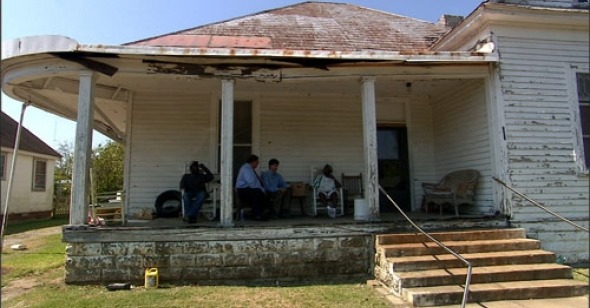Cashing In
by Michael Joshua Rowin
Maxed Out
Dir. James Scurlock, U.S., Truly Indie
One of the stranger statements attributed to George W. Bush immediately after September 11 was his plea to the American people to “Unite, consume, and fly.” Even if apocryphal, the words serve as a summation of the President’s actual strategy to rally the nation: in order for the capitalist system to stay afloat during crisis (and the wealthy elite to stay comfortably in power) our Commander in Chief urges consumption to remain at strong, pre-catastrophe levels.
Something is clearly wrong when the leader of the free world preaches spending instead of sacrifice in a new era of war and terrorism, and Maxed Out documentary filmmaker James Scurlock seeks to discover the workings of our phantom invulnerability, bolstered as it is by a tenuously fortified marketplace. A keystone of that marketplace, Maxed Out suggests, is a money-lending industry preying on the already stretched wallets of America’s working class (unprepared college students also take on the brunt of debt). Scurlock follows consumer watchdogs, investigative journalists, real-estate developers, debt collectors, pawnbrokers, business professors, and regular people screwed over by their banks and credit card companies to paint a portrait of a society at the continual mercy of debt and loans. His findings are fairly shocking: the most deceptive and cruel methods for roping already struggling citizens into contracts with tacked-on fees and other devastating catches are practiced not by fly-by-night swindlers but major financial institutions; an entire collection industry has developed to unrepentantly feast on the rotting bones of others’ financial corpses; credit company lobbyists draft legislation to strip customers of rights such as, say, the one to file for bankruptcy. Guess who signed that bill into law?
Maxed Out illuminates a significant portion of America’s financial landscape but leaves a lot of questions unanswered due to its aesthetic shortcomings. Like many documentaries released in the wake of the unprecedented success of Bowling for Columbine and Fahrenheit 9/11, Maxed Out emulates, whether consciously or not, the Michael Moore style by creating a cinematic patchwork of individual stories, archival footage, expert analysis, old films, and ironic songs. It’s a swirling collection of fragments left unstructured without an organizing principle or thesis, and at times it’s difficult to gather from the film exactly how the debt industry actually functions from the top down. Certain elements, like the interview with Robin Leach (yes, that Robin Leach), come across as frivolous celeb hunting, while others, like the interviews with Janne O’Donnell and Trisha Johnson, both mothers of children who committed suicide because of spiraling credit card debts, are moving testimonies marred by the overwrought inclusion of a mawkish Coldplay ballad (Queen and David Bowie’s “Under Pressure” blasts from the sound system at the beginning and ending of the film to ensure the audience’s emotional surrender). Other moments of heartstring tugging grind the film’s building momentum to a halt and force one to reassess the film’s investigative procedures.
But then, Maxed Out’s frequent messiness reflects the overwhelming unwieldiness of its subject. Even if Scurlock might have better served his study by delving deeper into the greater cultural forces behind financial irresponsibility, Maxed Out boldly spotlights an issue of monumental importance that has taken a backseat to the national conversation on the Iraq War. There are some unforgettable, eye-opening revelations and testimonies contained in Maxed Out, an accessible documentary that should lead viewers to make their own inquiries. Let a new conversation begin.

